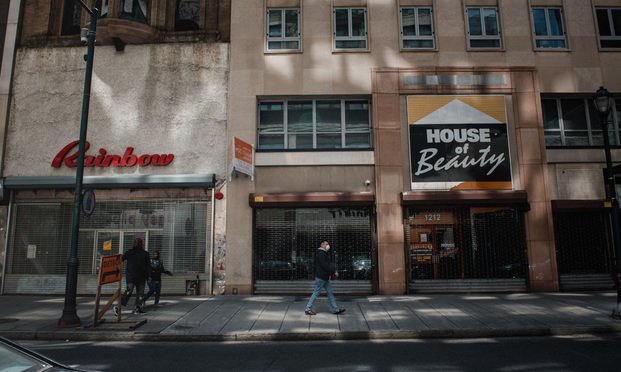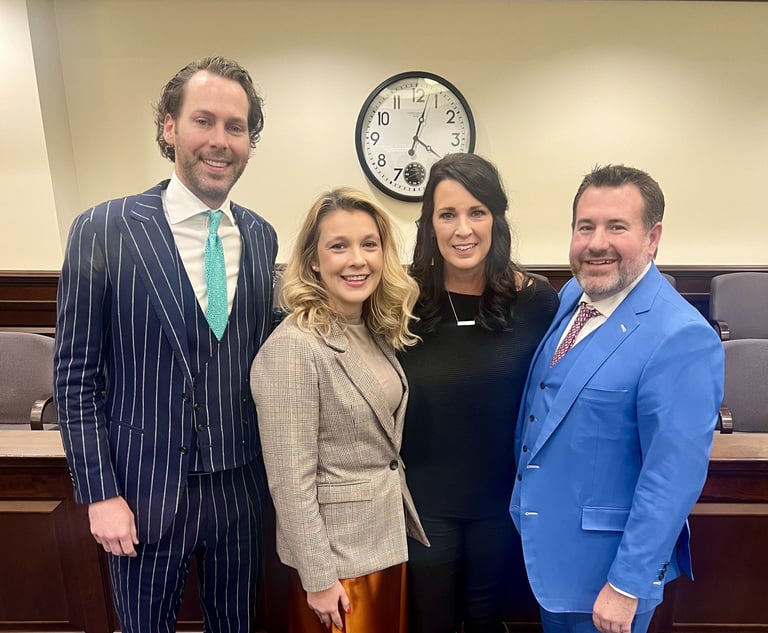Pa. High Court Refuses to Hear COVID-Related Business Interruption Coverage Dispute
Petitioners had also asked the court to consolidate all insurance claims related to the COVID-19 shutdowns into a single court in Pennsylvania.
May 15, 2020 at 02:31 PM
5 minute read
 A pedestrian wearing a protective mask walks by closed shops in Center City in Philadelphia on April 15, 2020. Photo: Hannah Yoon/Bloomberg
A pedestrian wearing a protective mask walks by closed shops in Center City in Philadelphia on April 15, 2020. Photo: Hannah Yoon/Bloomberg
The Pennsylvania Supreme Court has decided against using its King's Bench powers to resolve a dispute over whether insurance carriers must provide coverage for business interruptions that companies suffer as a result of the COVID-19-related shutdowns.
On Thursday, the justices issued a per curiam order denying the petition filed in the lawsuit, captioned Tambellini v. Erie Insurance. The case had given the high court the opportunity to invoke its plenary jurisdiction and wade into the question of what insurance coverage may be available as thousands of businesses across the state face lengthy business interruptions as a result of Gov. Tom Wolf's mandated statewide closures imposed to stem the spread of the coronavirus.
In a petition filed to the justices April 29, attorneys for restaurant owner Joseph Tambellini said a ruling from the Supreme Court on the issue could provide guidance to the "hundreds, if not thousands," of lawsuits that are expected to arise. A group of lawyers consisting of Haggerty, Goldberg, Schleifer & Kupersmith attorney James Haggerty; Scott Cooper of Schmidt Kramer; John Goodrich of Goodrich & Associates; and Kohn Swift & Graf attorney Jonathan Shub filed the petition.
Before filing the King's Bench petition Tambellini sued Erie in the Allegheny County Court of Common Pleas, seeking a declaratory judgment that Erie Insurance, which sold him a policy, must cover the damages from the shutdown. Specifically, Tambellini argued that his policy is an "all risk" policy, which provides coverage for all losses unless specifically excluded. Since the policy does not include a virus-related exclusion, the coverage must be available, he contended.
Along with asking the high court to rule on the coverage issue, Tambellini also asked the court to consolidate all insurance claims related to the COVID-19 shutdowns into a single court in Pennsylvania—much like what happens in a federal multidistrict litigation—so the claims could be handled quickly.
"The instant action presents issues of immediate public importance to not only plaintiff, Tambellini, but to all citizens of the commonwealth who are seeking recompense from their insurers for the losses, damages and expenses caused by the COVID-19 pandemic and the related governmental orders," Tambellini said in the petition. "Exercise of jurisdiction by the court is warranted by the immediate needs of citizens of the commonwealth who need resolution of the legal insurance coverage issues facing them in attempting to restart their businesses and their lives in the face of the losses, damages and expenses caused by the COVID-19 pandemic and the related governmental orders."
The Pennsylvania Supreme Court rarely takes up cases in its King's Bench jurisdiction, but the justices have shown some eagerness to get out in front of COVID-related litigation.
One case Tambellini cited in his petition was Friends of Danny DeVito v. Wolf, in which a collection of business owners sought to invalidate Wolf's shutdown order stopping the physical operations of all "non-life-sustaining" business. The companies filed their petition in late March, and the justices used their King's Bench powers to take up the case, ruling in mid-April to allow Wolf's order to stand.
That case was also appealed to the U.S. Supreme Court, which also rejected the case earlier this month.
In its May 7 response to the King's Bench petition, Erie argued the court should decline to fast-track the case because it was not one of immediate public importance.
"While the ongoing COVID-19 crisis itself obviously is of immediate importance to the nation as a public health matter, that fact alone does not establish that Tambellini's contractual dispute with Erie is of such immediacy that the normal litigation process and procedures that govern civil disputes in Pennsylvania should suddenly be disregarded entirely," Erie said in its petition.
Erie said that it was not attempting to minimize the hardships business face during the pandemic, but said the courts should not "panic" and be pressured to make "ad hoc" solutions to the problem.
Despite the Supreme Court's ruling, Cooper said he was hopeful the case can move through the court system quickly. A threshold question, he said, will be whether the loss counts as a "physical loss," which is a term used in most policies. Cooper said the issue could be decided on the pleadings, or through summary judgment, but either way it will end up being litigated all the way up to the Supreme Court.
"We were hoping to streamline it, but we're in it for the long haul. Hopefully the insurance companies won't try to delay things so we can keep it moving to get the threshold issue decided as fast as possible," he said. "It's going to go up. Someone's going to have to decide it."
Richard Dibella of DiBella Geer McAllister Best represents Erie and did not respond to a request for comment.
This content has been archived. It is available through our partners, LexisNexis® and Bloomberg Law.
To view this content, please continue to their sites.
Not a Lexis Subscriber?
Subscribe Now
Not a Bloomberg Law Subscriber?
Subscribe Now
NOT FOR REPRINT
© 2025 ALM Global, LLC, All Rights Reserved. Request academic re-use from www.copyright.com. All other uses, submit a request to [email protected]. For more information visit Asset & Logo Licensing.
You Might Like
View All
Philadelphia Eagles 0-2 in Attempts to Recover Insurance on COVID-Related Losses
4 minute read
High Verdicts and Venue Rule Land Pa. Courts on Top of 'Judicial Hellhole' List
5 minute read

Judge Approves $667K Settlement Against Independence Blue Cross for Unpaid, Pre-Shift Computer Work
4 minute readLaw Firms Mentioned
Trending Stories
- 1Settlement Allows Spouses of U.S. Citizens to Reopen Removal Proceedings
- 2CFPB Resolves Flurry of Enforcement Actions in Biden's Final Week
- 3Judge Orders SoCal Edison to Preserve Evidence Relating to Los Angeles Wildfires
- 4Legal Community Luminaries Honored at New York State Bar Association’s Annual Meeting
- 5The Week in Data Jan. 21: A Look at Legal Industry Trends by the Numbers
Who Got The Work
J. Brugh Lower of Gibbons has entered an appearance for industrial equipment supplier Devco Corporation in a pending trademark infringement lawsuit. The suit, accusing the defendant of selling knock-off Graco products, was filed Dec. 18 in New Jersey District Court by Rivkin Radler on behalf of Graco Inc. and Graco Minnesota. The case, assigned to U.S. District Judge Zahid N. Quraishi, is 3:24-cv-11294, Graco Inc. et al v. Devco Corporation.
Who Got The Work
Rebecca Maller-Stein and Kent A. Yalowitz of Arnold & Porter Kaye Scholer have entered their appearances for Hanaco Venture Capital and its executives, Lior Prosor and David Frankel, in a pending securities lawsuit. The action, filed on Dec. 24 in New York Southern District Court by Zell, Aron & Co. on behalf of Goldeneye Advisors, accuses the defendants of negligently and fraudulently managing the plaintiff's $1 million investment. The case, assigned to U.S. District Judge Vernon S. Broderick, is 1:24-cv-09918, Goldeneye Advisors, LLC v. Hanaco Venture Capital, Ltd. et al.
Who Got The Work
Attorneys from A&O Shearman has stepped in as defense counsel for Toronto-Dominion Bank and other defendants in a pending securities class action. The suit, filed Dec. 11 in New York Southern District Court by Bleichmar Fonti & Auld, accuses the defendants of concealing the bank's 'pervasive' deficiencies in regards to its compliance with the Bank Secrecy Act and the quality of its anti-money laundering controls. The case, assigned to U.S. District Judge Arun Subramanian, is 1:24-cv-09445, Gonzalez v. The Toronto-Dominion Bank et al.
Who Got The Work
Crown Castle International, a Pennsylvania company providing shared communications infrastructure, has turned to Luke D. Wolf of Gordon Rees Scully Mansukhani to fend off a pending breach-of-contract lawsuit. The court action, filed Nov. 25 in Michigan Eastern District Court by Hooper Hathaway PC on behalf of The Town Residences LLC, accuses Crown Castle of failing to transfer approximately $30,000 in utility payments from T-Mobile in breach of a roof-top lease and assignment agreement. The case, assigned to U.S. District Judge Susan K. Declercq, is 2:24-cv-13131, The Town Residences LLC v. T-Mobile US, Inc. et al.
Who Got The Work
Wilfred P. Coronato and Daniel M. Schwartz of McCarter & English have stepped in as defense counsel to Electrolux Home Products Inc. in a pending product liability lawsuit. The court action, filed Nov. 26 in New York Eastern District Court by Poulos Lopiccolo PC and Nagel Rice LLP on behalf of David Stern, alleges that the defendant's refrigerators’ drawers and shelving repeatedly break and fall apart within months after purchase. The case, assigned to U.S. District Judge Joan M. Azrack, is 2:24-cv-08204, Stern v. Electrolux Home Products, Inc.
Featured Firms
Law Offices of Gary Martin Hays & Associates, P.C.
(470) 294-1674
Law Offices of Mark E. Salomone
(857) 444-6468
Smith & Hassler
(713) 739-1250





